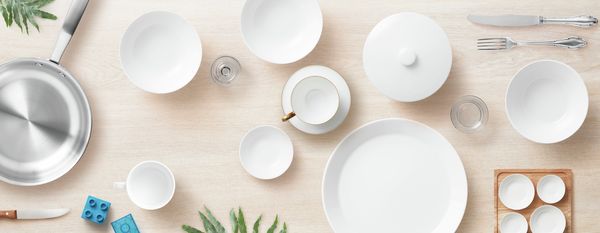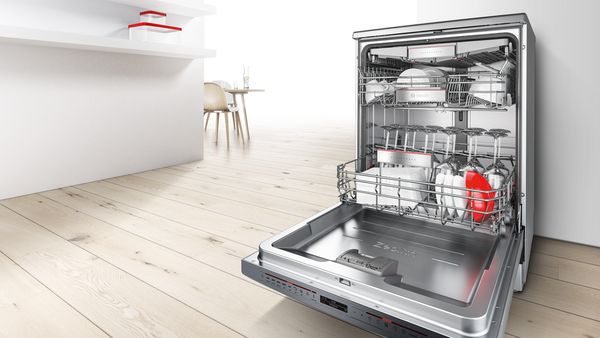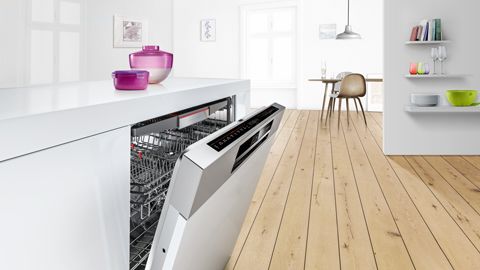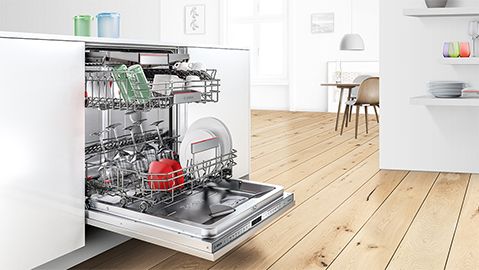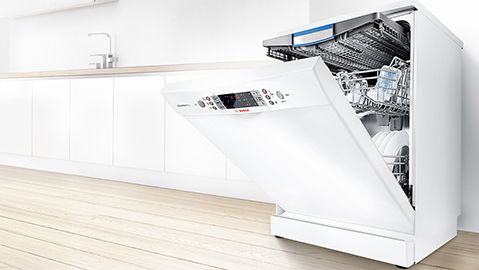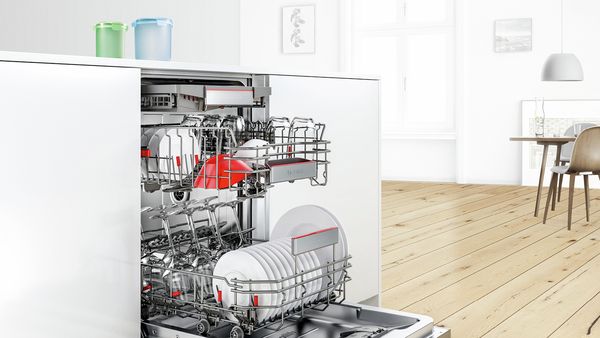
Everything has its place.
Plastics should be placed in the upper tray where the heat is less fierce. This way, you won't end up with plastic spatulas that look like cockscrews, and the colour won't fade. Cups, bottles and bowls belong in the bottom tray. Try not to wedge things in – cutlery, closures and those little bits and bobs should go in the cutlery box. Knives and forks, of course, should be placed face down for safety reasons. But keep in mind, they will be cleaner the other way up.
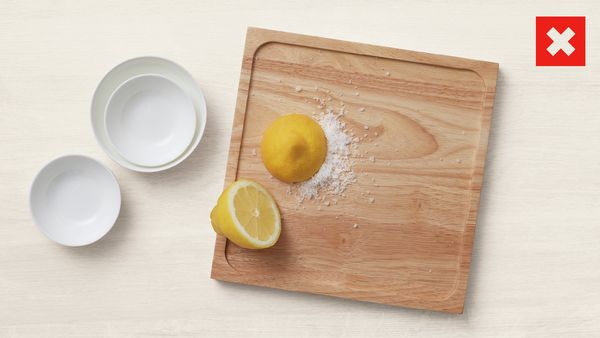
Wood stays out.
Wooden cutting boards, spoons or cutlery should be rinsed and washed by hand. The wood can swell or warp, when wet or damp. In a dishwasher the high temperatures can cause cracks where bacteria can multiply. Wooden handles can also simply fall off as the adhesive comes under pressure and dissolves.
Good to know:
Wooden cutting boards are best cleaned with lemons! Try this: cut a lemon in half, rub the chopping board all over with one half of the lemon and then liberally sprinkle the board with coarse salt. Leave the salt to work for 10 minutes, then rub the board with the other half of your lemon and rinse off with water.
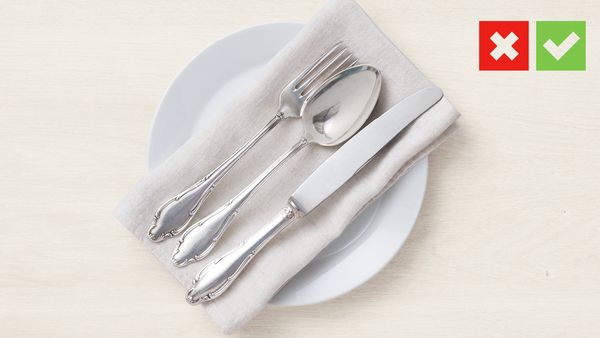
Silver. In the dishwasher? Maybe!
Your dishwasher is probably not the best place for the family silver. The silver can start to literally be washed away, and ugly black marks can start to appear. Unless that is, your cutlery is made from 925 silver, which is dishwasher safe. If you want to be even safer, use a box for silver cutlery for dishwashers.
Good to know:
You can get your silver to shine again with baking powder, or surprisingly, in the hot water used to boil potatoes. Yes, it’s true. To get rid of black marks on your silver, try a little toothpaste.
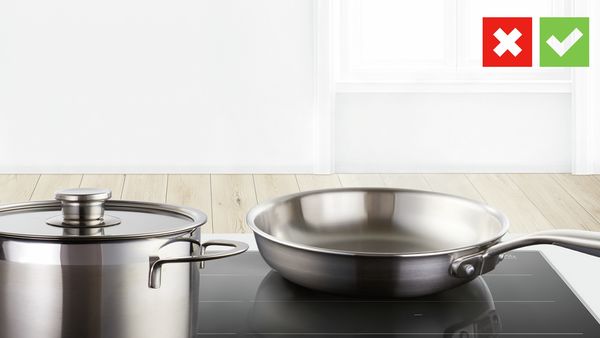
Protect pots and pans.
Many pans are now dishwasher-proof. That said, some non-stick pots and pans can still lose their non-stick ability because their special coating is attacked in the dishwasher. Pots without a non-stick coating, of course, can still be safely cleaned in your dishwasher.
Good to know:
Really tough, burn spots in your pans can be removed with warm vinegar or hot salt water. For even more stubborn spots, use that good old stand by – the best baking powder.
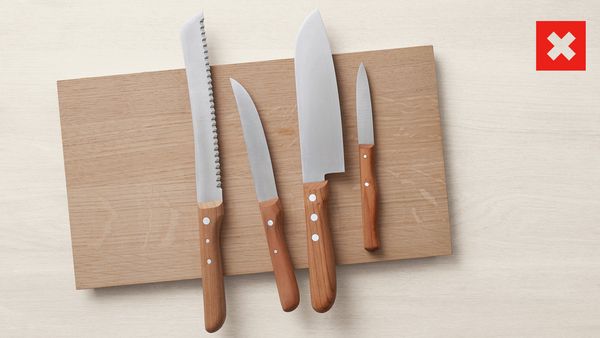
A prickly affair: knives.
Sharp cooking knives and especially high-quality table knives should probably not be in the dishwasher but are better cleaned by hand. In a dishwasher, the blades will become blunt due to the salt. If they have wooden handles, they could be loosened by the scalding hot water.
Good to know:
Don’t just leave your knives in the washing up water. Wash them separately in lukewarm water and then dry them thoroughly.
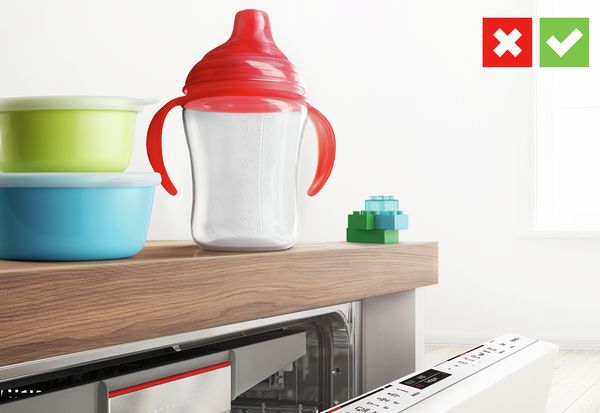
Normally dishwasher safe: plastic.
Plastic preserving jars can usually be washed in your machine without problems. Most plastic containers have a label on the base which indicates if it is “dishwasher safe”, or “not dishwasher safe”. Some non-dishwasher-safe items can release dangerous pollutants when washed in very hot water. Oh, and by the way, Bosch has an extra benefit for plastics with its Zeolith® technology. It dries plastics very well compared to conventional dishwashers.
Good to know:
Do you have any discoloured storage jars? Place them outside in the sun, and get them bleached for free.
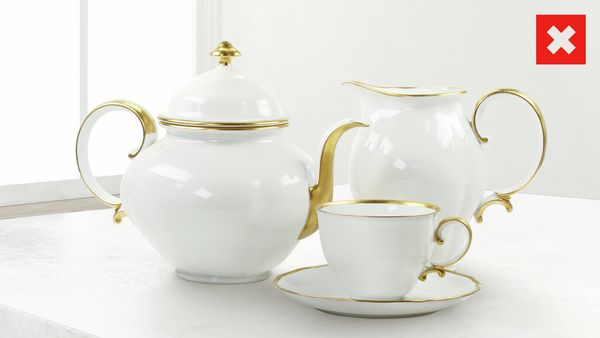
The rules for gold.
Grandma’s beloved porcelain was probably made before dishwashers were even thought of, so it probably won’t survive the high temperatures. A beautiful ornate cup could lose the gold leaf rim detail, or that gorgeous inherited plate could break. Even new, very expensive porcelain should be given extra care. Despite the fact that it is “dishwasher safe” it is often not really suitable for such high temperatures.
Good to know:
You should carefully clean printed or gold leaf on porcelain and avoid any abrasives or indeed hard sponges.
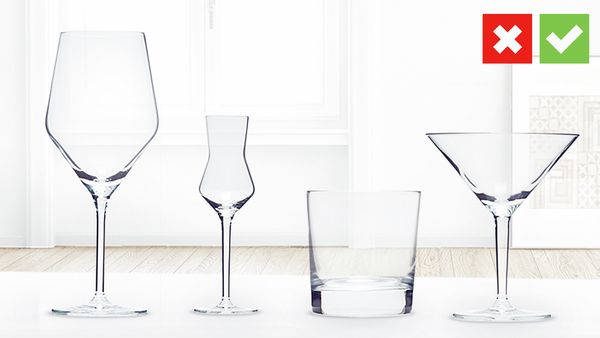
Glasses? Yes, they can!
Glasses can, in principle, be cleaned in your dishwasher. That said, milky glass, or glasses with printed patterns are probably not dishwasher-proof. Just remember, glasses and especially delicate wine and champagne glasses should not be placed too close together in the machine. Bosch offers dishwashers with innovative glass protection.
Good to know:
Glasses should always be rinsed first by hand before going in the dishwasher. You can make cleaning milky glasses a little easier with a shot of vinegar or citric acid in hot water.
